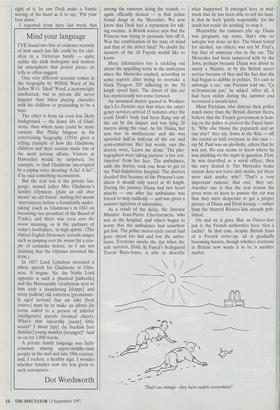Mind your language
I'VE found two bits of evidence recently of how much fun life could be for chil- dren in a Victorian family — quite unlike the dark mahogany and mutton fat atmosphere that period pieces on telly so often suggest.
One very different account comes in the biography by Wilfrid Ward of his father W.G. 'Ideal' Ward, a heavyweight intellectual, but in private life never happier than when playing charades with his children or pretending to be a bear.
The other is from an even- less likely background — the home life of Glad- stone, than whom none could be more earnest. But Philip Magnus in his entertaining biography (1954) gives a telling example of how the Gladstone children and their cousins made fun of the most serious affairs. Visitors at Hawarden would be surprised, for example, to find Gladstone interrupted by a piping voice shouting 'A lie! A lie!', if he said something inconsistent.
But the real test is the private lan- guage, named (after Mrs Gladstone's family) Glynnese. Quite an old shoe meant 'an old friend', bathing-feel meant `nervousness before a formidable under- taking' (such as Gladstone's in 1841 on becoming vice-president of the Board of Trade), and there was even over the moon meaning, as in the parlance of today's footballers, 'in high spirits'. (The Oxford English Dictionary records usages such as jumping over the moon for a cou- ple of centuries before, so I am not claiming that the Glynnes invented the term.) In 1857 Lord Lyttelton invented a whole speech for Gladstone in Glyn- nese. It begins: 'Sir, the Noble Lord opposite is such a phantod [imbecile] and the Honourable Gentleman next to him such a daundering [sloppy] and wizzy [sallow] old totterton [premature- ly aged person] that my take [best course] must be to make an idiotic [in terms suited to a person of inferior intelligence] speech (ironical cheer). What's that unearthly [nasty] little sound? I shoot [spy] the buckish [too familiar] young mawkin [stranger]!' And so on for 1,000 words.
A private family language was fairly common among upper-middle-class people in the mid and late 19th century, and, I reckon, a healthy sign. I wonder whether families now are less given to such enterprises.
Dot Wordsworth


































































 Previous page
Previous page